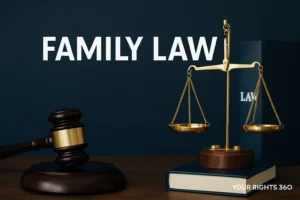Real estate law includes many terms that sound confusing. One of them is “constructive notice.” This term may not seem important at first. But it can affect your rights as a buyer, seller, or property owner. It can even shape how courts decide certain disputes. That is why it helps to understand what it means and how it works.
You may think that only what you know matters in real estate deals. But the law says otherwise. Sometimes, the law treats you as if you knew something, even when you didn’t. That is the heart of constructive notice. It’s not about what you actually knew. It’s about what you should have known.
This rule keeps things fair and public. It protects property rights and avoids hidden claims. If someone records a deed or lien in public records, others can’t claim they had no idea. The law says you had a duty to check. If the record exists, you are seen as having notice, even if you didn’t look.
In this article, we break down the idea of constructive notice in real estate. We explain how it works, why it matters, and how to protect yourself. The goal is to make this complex topic simple, clear, and useful to anyone involved in real estate.
What Is Constructive Notice?
Constructive notice is a legal concept. It means the law assumes you know something because it was available to find. In real estate, it often refers to information filed in public records. Once a document is recorded with the county, it becomes public. Anyone can check it. So the law treats all people as if they know what’s in those records.
Let’s say someone buys a house, and a lien is on file. Even if the buyer never saw it, the law says they “knew” about it. That’s because the lien was part of the public record. The buyer had the chance to check before closing the deal.
This idea keeps buyers honest. It also protects those who record their rights. If you record a deed or mortgage, it puts the world on notice. Others can’t say they didn’t know. The record speaks for itself.
Actual vs. Constructive Notice
Actual notice means you really knew something. You saw the deed. You heard about the claim. Someone told you, and you understood. That is direct knowledge.
Constructive notice is different. You may not have known anything at all. But the law still holds you responsible. It says, “You should have known.” This is not about what you learned. It’s about what you could have learned if you checked.
Both types matter in real estate. Courts may ask: Did the buyer have actual notice? If not, did they have constructive notice? If the answer is yes to either one, the buyer may lose certain rights.
Why It Matters in Real Estate Deals
Real estate deals involve large sums of money. One mistake can cost thousands or more. Constructive notice protects everyone involved. It keeps records open. It gives buyers a way to verify the truth. It also encourages owners to record their rights.
If you buy a property without checking the title, you take a risk. A recorded lien, easement, or old deed may change your rights. The court may say you had notice, even if you didn’t know. That can hurt your case.
Constructive notice helps buyers make informed choices. It helps sellers clear their records. It helps lenders protect their claims. Without it, hidden problems could cause chaos. This rule brings order to property law.
Public Records and Recording
Public records are key to constructive notice. When a person records a document, like a deed, lien, or mortgage, it becomes part of the public file. County offices keep these records. Anyone can search them.
This system is open and fair. It gives everyone a chance to learn about a property’s history. Buyers can see past owners. Lenders can see other loans. Neighbors can check for easements. Title companies use these records to issue insurance.
If a document is not recorded, the law may not apply constructive notice. That’s why timing matters. If you record a deed too late, someone else may win their claim. The one who records first often has stronger rights.
Common Issues Tied to Constructive Notice
Undisclosed Liens
A lien may be recorded, but not shown to the buyer. If it exists in the records, the buyer has constructive notice. They may have to pay the debt or lose the property. Title searches help prevent this.
Prior Deeds
An old deed may still show someone else as the owner. If the buyer ignores this and moves forward, the court may not protect them. The public record puts them on notice.
Easements
An easement lets someone use part of your land. It may be on file from years ago. Even if it’s not visible, the law says you had notice if it was recorded. This can limit how you use your property.
Fake Sales or Double Transfers
Sometimes a seller gives deeds to two buyers. If one records the deed first, they gain rights. The second buyer may lose, even if they acted in good faith. The first buyer gave the world constructive notice.
How to Protect Yourself as a Buyer
Check the title before you buy. Use a title company or real estate attorney. Review all records. Look for liens, deeds, easements, and claims. Do not skip this step. It gives you real notice and helps avoid legal surprises.
Ask for title insurance. This protects you from hidden problems, even those missed in a search. If someone claims rights after your purchase, the insurance can pay for losses.
Record your deed right after closing. Do not wait. Make sure the record reflects your ownership. This gives others notice that the property now belongs to you.
What Sellers and Owners Should Do
If you own property, keep your title clear. Remove old liens. Record your mortgage releases. If you grant an easement or change ownership, record it right away. Delay can lead to disputes.
If you lease or share property, put the terms in writing. Then record the document. This avoids confusion later.
If you sell a home, work with a title company. Make sure your buyer gets clean title. This helps the deal close faster and builds trust.
How Courts Use Constructive Notice
Courts use constructive notice to decide fairness. If a buyer claims they didn’t know about a lien, the court asks: Was it recorded? If yes, then the buyer had notice.
This rule may seem strict. But it keeps people from avoiding the truth. It pushes buyers to ask questions and search records. It rewards those who take the time to do things right.
If someone records first, they gain stronger rights. The law protects public records. It treats them as public knowledge. Courts use this standard to settle land disputes and title claims.
The Role of Title Insurance Companies
Title insurance companies play a big role. They check the records before a sale. They help find problems that may cause legal risk. If they miss something, they may cover the loss.
These companies give buyers peace of mind. They know how to read records. They know what counts as notice. They help explain the risks. Most buyers rely on them to handle this part.
Still, the buyer must stay alert. Ask questions. Read the report. Understand what you are signing. Title companies are helpful, but not perfect. A buyer who ignores warning signs may still be at risk.
What You Should Remember
Constructive notice is not about what you knew. It is about what the law says you should have known. If something is in the public record, you are treated as if you saw it. That rule protects others and makes real estate safer.
Buyers must check records. Sellers must record documents. Owners must keep titles clear. Lenders must secure their interests. Each part depends on public notice. That is how the system works.
Without this rule, chaos would follow. Property rights would shift too easily. Claims would appear from nowhere. With it, the system stays strong.
Conclusion
Real estate comes with risk. A home or building may have hidden claims. Someone may have rights you don’t see. But you have tools to protect yourself. Public records, title searches, and insurance can help.
Do not skip the title search. Do not ignore past documents. Ask questions. Read reports. Take time to know the facts. That work may save you money, time, and stress.
The law expects you to do your part. If the record shows a claim, the court may say you had notice. That is how constructive notice works.
It may not sound fair, but it keeps the system clear. It rewards those who act wisely. It protects those who record early. In real estate, what you should know may matter more than what you do know. So check the record. Protect your rights. And move forward with confidence.
Disclaimer
This article is for general information only. It does not give legal advice. Speak with a licensed attorney before making any real estate decision.




